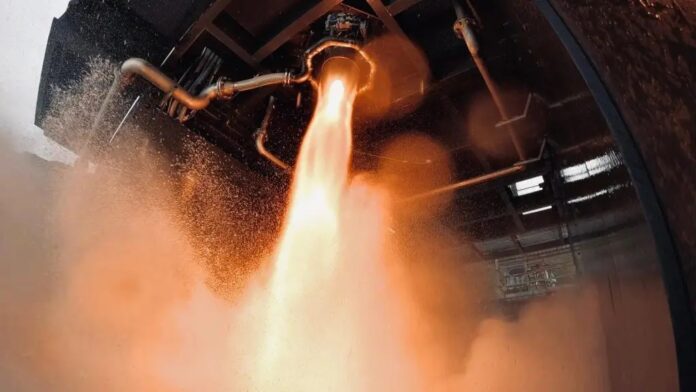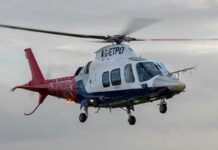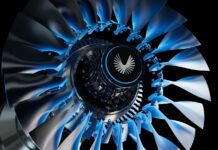To prepare for its first commercial launch, Skyrora, a UK-based designer and manufacturer of rockets, has begun a series of full-duration tests to qualify the updated design of its 70kN engine. The engines have been 3D printed using the company’s Skyprint 2 additive manufacturing machine for the first time, halving the production time and reducing costs.
The new engine design features an improved engine cooling chamber to increase the efficiency of the cooling process and, in turn, extend the engine’s life cycle. Compared to the original model, Skyrora’s 70 kN engines can now be manufactured approximately 66% faster at a 20% cost reduction.
The engine tests will evaluate various parameters including life cycle and full operational envelope testing while the engine runs for 250 seconds, the same amount of time that it will run in a real mission to reach orbit. A successful test will be indicated by nominal chamber pressures and thrust levels with no damage to the hardware. A test article iteration consisting of data analysis, design adjustments, and manufacturing can be completed in approximately three weeks.
Upon qualification, the updated 70 kN engine will become the first ever commercial engine to use a closed-cycle staged combustion system run on a propellant combination of Hydrogen Peroxide and Kerosene. While it has not been used historically due to its complexity, the higher specific impulse generated through this design will increase the overall efficiency of the engine.
“The new models of 3D printed engines are bringing Skyrora closer towards efficient commercial orbital launch. With our purpose-built rocket manufacturing and testing facilities in Scotland, we are proud to be localising as much of the launch value chain as possible. The new engine technology developed by Skyrora’s engineers and the commitment to a sustainable design are a testament to the innovation taking place in the UK space sector,” CEO and Founder Volodymyr Levykin said.
With further support from ESA’s Boost! programme, the updated engine design was fully developed via Skyrora’s in-house additive manufacturing capabilities and will act as a critical component on the first and second stages of Skyrora’s XL orbital vehicle. A collaboration with the National Manufacturing Institute of Scotland (NMIS) will qualify the machine, materials, and process of machining for Skyprint 2. These qualifications will enable Skyprint 2 to be used by third parties commercially, further diversifying Skyrora’s commercial offering within the new space market.
Upon completion of the engine qualification programme, Skyrora plans to build a series of production engines to test the full first stage of Skyrora XL, the final stage to be tested prior to a demo orbital launch.
Remember, you can post free of charge job opportunities in the AM Industry on 3D ADEPT Media or look for a job via our job board. Make sure to follow us on our social networks and subscribe to our weekly newsletter : Facebook, Twitter, LinkedIn & Instagram ! If you want to be featured in the next issue of our digital magazine or if you hear a story that needs to be heard, make sure to send it to contact@3dadept.com.






